

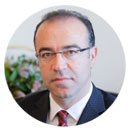
Dr. Vasilis Gregoriou
Research Director, Institute of Chemical Biology (ICB | NHRF)
Dr. Vasilis Gregoriou is Research Director at the Institute of Chemical Biology (ICB | NHRF) and former Director and Chairman of the Board at the National Hellenic Research Foundation (NHRF), during 2013-2022. Dr. V. Gregoriou holds a Ph.D. in Physical Chemistry, 1993, Duke University, Durham, North Carolina, USA. He also received the prestigious National Institutes of Health(NIH) Research fellow/NRSA Award from Princeton University, Princeton, New Jersey, USA, 1994. Dr. V. Gregoriou is an internationally recognized scientist who, during his 30 year career has worked in research and management positions in Greece (the National Hellenic Research Foundation, the Foundation of Research and Technology-Hellas) and in the United States (Princeton, Polaroid, MIT, Northeastern University, Advent Technologies). His research activity in materials science includes nanomaterials with potential applications in biomarker detection and neoplastic imaging. He is the coauthor of 3 books, 6 chapters in books, 81 refereed research papers and the co-inventor of 11 patents. Dr. Gregoriou is also the National Representative of Greece to the European Research Council (ERC) Committee for Horizon 2020, Marie Sklodowska-Curie and Future and Emerging Technologies (FET).
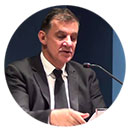
Professor Meletios-Athanasios Dimopoulos, MD
University of Athens, Alexandra Hospital
Professor Meletios-Athanasios Dimopoulos is Rector of the University of Athens and serves at the University of Athens as a Professor, Director of the University Clinic of Therapeutics of the Alexandra Hospital belonging to the Medical School. He holds the speciality of Hematology and Oncology from the University of Texas (MD Anderson Cancer Center, Houston, Texas, USA), where he also served as Assistant Professor. He has been a leader in the establishment, recruitment and operation of the Hematology-Oncology Unit of the Therapeutic Clinic, which daily treats and administers 70 to 100 patients with oncological diseases. This clinic is considered worldwide as a model unit with significant clinical and research work, specializing in plasma cell malformations (multiple myeloma, macroglobulinemia, amyloidosis), breast cancer, gynecological cancer, prostate, kidney and bladder cancer.
Read more: https://docs.wixstatic.com/ugd/63330b_825edd2a493f4a54a750f958de6a3306.pdf
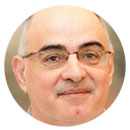
Dr. Alexandros Pintzas
Director, Institute of Chemical Biology (ICB | NHRF), Greece
Dr. Alexandros Pintzas is the Director of the Institute of Chemical Biology (ICB | NHRF) and a member of the Board of Directors of the National Hellenic Research Foundation (NHRF). Dr. A. Pintzas is a recognized cancer research scientist who has been working for over 30 years in Greece and Europe (Cancer Research UK Beatson for Cancer Research, Glasgow, UK and IGBMC Research Institute, Strasbourg- Ilkirch, France). Dr. A. Pintzas has been a visiting researcher in academic institutions and pharmaceutical companies in Europe and the United States. He has also served as coordinator of major European and Greek cancer research programs, with a large number of collaborating researchers and institutions. His research interests focus on the scientific areas of oncogenic cell signaling and the use of knowledge in new cancer therapies in the era of precision medicine.
Read more: http://www.eie.gr/nhrf/institutes/ibrb/programmes/smgenexp-en.html
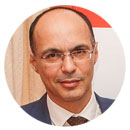
Professor Antonis Kattamis, MD
Professor of Paediatric Hematology–Oncology, University of Athens
Head of the Division of Hematology-Oncology of the 1st Department of Pediatrics, University of Athens, "Aghia Sofia" Children's Hospital, Athens, Greece
Antonis Kattamis is Professor of Paediatric Hematology–Oncology at the National and Kapodistrian University of Athens. He received his MD degree (cum laude) in 1988 from the National and Kapodistrian University of Athens. He completed his training in Pediatrics at the University of Texas Health Science Center in San Antonio, USA and in Pediatric Hematology–Oncology at the Children’s Hospital of Philadelphia, University of Pennsylvania School of Medicine, USA.
Prof Kattamis is the Head of the Division of Hematology-Oncology of the First Department of Pediatrics, National and Kapodistrian University of Athens, "Aghia Sofia" Children's Hospital, Athens, Greece. The Oncology Unit, which is part of the Division, is the largest pediatric oncology unit in Greece, taking care around 20-30% of all the pediatric and adolescent patients with neoplastic diseases that are diagnosed in Greece on annual basis. The Hematology Unit/Thalassemia Unit, which is part of the division, is the largest one in Greece where more than 500 patients with Thalassemia and other congenital anemias are followed.
Prof Kattamis has participated in many consulting committees, like the Ministry Counseling Board on Thalassemia, and council boards , like the ones of the Athens Comprehensive Cancer Center, the European Society of Pediatric Hematology Immunology and the Hellenic Society of Pediatric Hematlogy-Oncology, of which he has been elected President (2018-19).
He has published more than 100 articles in different journals like Blood and Haematologica, mainly in the field of hemoglobinopathies, iron metabolism and pediatric hematology -oncology. He has been given many lectures around the world in national and international meetings, including ASH, ΕΗΑ and Thalassemia International Federation. He has participated in numerous clinical trials and collaborative research programs, funded by the European Union (FP7), the University and Pharmaceuticals companies. He has served in the Steering Committees in pivotal clinical studies. He has been participating in SIOP-E and iBFM oncology protocols and is the National Coordinator for certain types of Brain Tumors.
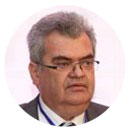
Professor Efstratios (Stratis) Patsouris, MD
Professor of Pathology, University of Athens
Stratis Patsouris is Professor and Chairman of the First Department of Pathology, National and Kapodistrian University of Athens from 2003. He received his MD degree in 1975 from University of Athens and continued his training in Internal Medicine (1976-1978) in Athens Naval Hospital in Athens, in Neurology-Psychiatry in Aeginition University Hospital in Athens (specialty of Psychiatry, 1982), in Pathology in the Dept of Pathology, Medical School, University of Athens (specialty of Pathology, 1986). He completed his training in Hematopathology in the Institute of Pathology in Kiel (Germany, Dir. Prof. K.Lennert, 1983-1986) and in Neuropathology, University of Munich and Hamburg (specialty of Neuropathology, Germany, 1995).
Professor Patsouris is since 2003 the Chairman of the First Department of Pathology, University of Athens, the largest Pathology Department of Greece, which receives 40.000 cases per year from 30 different hospitals of the country and 9.000 cases from Laikon University Hospital, Athens and has the largest Unit of Molecular Pathology in Greece.
Professor Patsouris received 7 international scholarships and 15 awards for best research project in International and Hellenic Congresses. He has received as project leader 16 competitive greek and 3 european research grants, and he has been actively involved in 7 european funded projects (European cooperation consortiums). He has been a member of international research groups and consultant of the European Union in his areas of expertise (prion disease, encelopathies). He represented Greece in 32 international scientific meetings and 12 organising and managing meetings regarding the area of Pathology. He is a member and president of many greek and international scientific consultant committees and 17 international and greek scientific organisations. For 6 years he was the president of the Greek Organisation of Neuropathology, he was also a member and later president of the district scientific board of biosciences, and of the National Board of Research and Technology of the ministry of education (2009, 20011-2012).
He has published 436 articles in different international journals (peer-reviewed publications) mainly in the areas of Pathology of Neoplastic Diseases, of Hematopathology and Neuropathology. The total number of citations is 7.710 and the H-index is 42.
Professor Patsouris was vice President of the Medical School of the National and Kapodistrian University of Athens (2011-2013), Dean of the School of Health Sciences, University of Athens (2014-2018) and is Director and President of the Board of Directors of the University Research Institute of Mental Health, Neurosciences and Precised Medicine, University of Athens.

Professor Evi Lianidou, PhD
Professor of Analytical Chemistry – Clinical Chemistry, Laboratory of Analytical Chemistry, Analysis of Circulating Tumor Cells (ACTC) Lab, Dept. of Chemistry, University of Athens
Dr. Evi Lianidou is Professor of Analytical Chemistry and Clinical Chemistry at the Department of Chemistry, University of Athens, Greece. Dr Lianidou has established a Molecular Diagnostics Laboratory focused on Liquid Biopsy at the Department of Chemistry since 1998 (http://en.actc-lab.chem.uoa.gr/). The Analysis of Circulating Tumor Cells (ACTC) lab is focused on liquid biopsy analysis, and is ISO-15189 certified (ESYD accreditation) for: a) CTC enumeration, using the FDA-cleared CellSearch System (Menarini Silicon Biosystems) and b) The FDA cleared EGFR mutation testing in plasma ctDNA test (COBAS, Roche). The lab has access to many patient samples through extensive clinical and research collaborations. Dr. Evi Lianidou’s main research interests are on the development and clinical evaluation of: a) single-plex and multiplex quantitative RT-qPCR assays for the detection and molecular characterization of CTCs, b) multiplex assays for gene expression in CTCs based on the liquid bead array, c) DNA methylation assays in CTCs and ctDNA, d) highly sensitive assays for mutation analysis in CTCs and in ctDNA, and e) evaluation of circulating miRNAs and exosomes as tumor biomarkers in plasma.
Dr. Lianidou has 115 publications (https://www.ncbi.nlm.nih.gov/pubmed/?term=lianidou) and has organized together with Prof K. Pantel four international meetings on liquid biopsy: a) the 7th International Symposium on Minimal Residual Disease in Athens, (http://ismrc2009.chem.uoa.gr) , b) the 1st “Advances in Circulating Tumor Cells: From Basic Research to Clinical Practice” (www.actc2012.org), c) the 2nd ACTC meeting, (October 8th-11th, 2014), in Crete, Greece (www.actc2014.org) and d) the 3rd ACTC meeting, (October 4th-7th, 2017), in Rhodes, Greece (www.actc2017.org). She is now organizing the 4th ACTC meeting in Corfu, Greece (www.actc2019.org).
Prof. Lianidou is PI in the European TRANSCAN group “CTC-SCAN” and in the EU IMI Network Project “CANCER-ID” (www.cancer-id.eu) and serves on the Editorial Boards of many international journals including Clin Chemistry, Clin. Cancer Res, Breast Cancer Res, Cancer Res, Oncotarget, and many others. Dr. Lianidou is an elected member and Chair of the Committee for Clinical Molecular Biology Curriculum of the International Federation of Clinical Chemistry (IFCC), (http://www.ifcc.org/ifcc-education-division/emd-committees/c-cmbc/) and is coordinating the M.Sc. program of Clinical Chemistry, at the Department of Chemistry, University of Athens (http://en.clinical-chemistry.chem.uoa.gr/).
Read more: http://en.actc-lab.chem.uoa.gr/

Dr. Drakoulis Yannoukakos
Molecular Diagnostics Laboratory, NCSR Demokritos
Drakoulis Yannoukakos, PhD, Director of Research. He is the Head of Molecular Diagnostics laboratory at the NCSR Demokritos. He obtained a Ph.D. in Biochemistry from the Université de Paris XII in France. He trained as a Post-doctoral fellow in the Department of Molecular Medicine, Beth Israel Hospital, Harvard University Medical School and later on in the Department of Molecular Pharmacology, New York University Medical School. He is the founder of Molecular Diagnostics Laboratory since 1998 as a reference laboratory in Greece for Cancer Genetics. His research in Cancer Genetics focuses on the analysis of hereditary cancer syndromes. He has co-authored 104 peer-reviewed scientific publications with most of them being related to Cancer Genetics. He has served as a reviewer of international research journals (e.g. Nature Genetics) and funding agencies. He has received grants from the Greek General Secretariat of Research and Technology, the Ministry of Health, the Hellenic Cooperative Oncology Group and the European Community. He participates at major international consortia related to cancer genetics such as Consortium of Investigators of Modifiers of BRCA1 and BRCA2 (CIMBA), Breast Cancer Association Consortium (BCAC), Evidence-based Network for the Interpretation of Germline Mutant Alleles (ENIGMA), Ovarian Cancer Association Consortium (OCAC), The Triple Negative Breast Cancer Consortium- TNBCC and The PALB2 Consortium.

Dr. Aristotelis Chatziioannou
Institute of Chemical Biology (ICB | NHRF), Greece
Dr. Aristotle Chatziioannou is a collaborating researcher of the Metabolic Engineering and Bioinformatics Group at the Institute of Chemical Biology (ICB | NHRF), Athens. His research interests target bioinformatics and computational biology, with emphasis on in-silico models, Big Data Integrative Analytic workflows, knowledge-mining in life sciences, multi omics and phenomics , molecular pathway analysis & network biology, biological ontologies, biostatistics, metabolic engineering, and biomedical image processing. He has been Invited Professor during 2012-2013, for CNRS and INSERM at Bordeaux, France. Besides, he is core founder of e-NIOS Applications PC, an NHRF, Digital biotech, spin-off SME, in the area of intelligent genomic analysis of complex biological data. According to EU the company is one of the national success stories regarding Tech Innovation. He is co-author in more than 65 journal articles and above 150 international conference papers in these fields (h-index:18, 1100 citations, source Google Scholar). He has participated in a coordinating role, in more than 15 European and National Research Grants. He has contributed actively in the national strategic planning of research policies as Vice President of the Hellenic Union of Researchers (2 tenures, 2009-2015), and two tenures in the Board (Vice President) of the NHRF Personnel Association. He has been member of the Panel of Experts of the Hellenic National Committee of Research and Innovation that elaborates a National Roadmap for Research and Innovation Policy Planning in Greece and Substitute member at the Board of the Hellenic State Foundation of Scholarships. Recently, he was appointed member of the Executive Board of GRNET, the national, computational infrastructure for research and academic activities. He is the Tools Platform and Deputy Technical Coordinator of the Hellenic Node of ELIXIR and the Treasurer of the Administrative Board of the Hellenic Society of Computational Biology and Bioinformatics.
Read more: http://www.eie.gr/nhrf/institutes/ibrb/cvs/cv-chatziioannou-gr.pdf

Dr. Vassilis L. Souliotis
Research Director, Institute of Chemical Biology (ICB | NHRF), Athens
Dr. Vassilis L. Souliotis has been a group leader at the Institute of Chemical Biology, National Hellenic Research Foundation since 2001. His research interests focus in the field of cellular DNA damage response and repair (DDR/R) network, with a longstanding interest in the area of DNA damage formation and repair following exposure to genotoxic agents. Dr Souliotis’ group is focusing on genotoxic drugs (melphalan, platinum-based drugs) in order to assess the prospect of designing cancer chemotherapy protocols of improved efficacy through the optimization of the induction of cytotoxic DNA damage and to examine interindividual variation in DNA repair as a marker for predicting differences in therapeutic response and long-term outcome. Over the past few years, he is also working on the pathogenetic mechanisms of autoimmune diseases, by studying the interplay between the DDR network and the immune response (ImmR) system.
More specifically, current interests focus on:
Read more: http://www.eie.gr/nhrf/institutes/ibrb/cvs/cv-souliotis-gr.pdf
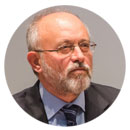
Dr. Vassilis Zoumpourlis
Institute of Chemical Biology (ICB | NHRF), Athens
Dr. Vassilis Zoumpourlis is Director of Research and Head of the Biomedical Applications Unit within the Institute of Chemical Biology of the NHRF. He is a Researcher Grade A since 2013 and is also head of the certified NHRF animal house.
He obtained his BSc in Molecular Biology and Genetics at University of J E Purkyne, Brno, Czech Republic in 1987, his M.Sc. from the same University in 1988 and his Ph.D. from the Medical School of Crete in 1994. She has practiced research in top Institutions in Europe and USA. In 1992-3 he served as a visiting Researcher in the Molecular Oncology Group in The University of Liverpool, UK, in 1995 in Marie Curie Institute, Paris, France, in 1998 in Sylvius Laboratory, Leiden, Netherlands, in 2002 in the Department of Molecular Biology, Amsterdam, Netherlands. Since 2004 he has also worked in the Mazaryk Institute, Brno, Czech R, in Paterson Institute, Cancer Research, Manchester, UK, & Roy Castle Lung Cancer Institute, The University of Liverpool, UK, as well as in the Comprehensive Cancer Center, University of California, San Francisco, USA. He has supervised 14 diplomas, 9 Master thesis, 25 PhD thesis and 10 Post-Doc Researchers. Since 2004 he is a Lecturer at Msc classes, Universities of Athens, Patras, Thrace and Crete. The topic of his lectures is based on the molecular mechanisms of cancer and stem cell biology.
The interests of Dr. Vasilis Zoumpourlis cover the field of the molecular biology of cancer, mainly the study of genes with a crucial role in the molecular mechanisms of multistage carcinogenesis (initiation, promotion, progression) and metastasis. Recently he has been actively involved in the intriguing research of stem cells and their applications in cancer therapeutics and drug toxicity screening. The current challenge is to develop new generation translational products for cytotherapy-based cancer management and testing of drugs. To this end, Dr. Vassilis Zoumpourlis group has recently transferred its long-term experience and know-how in molecular biology of cancer in the emerging field of stem-cell biology, in order (a) to design stem cell-based vehicles for effective and specific tumour targeting and (b) to develop improved in vitro preclinical assays for quick and reliable assessing of toxicology and safety profiles of drugs.
Read more: http://www.eie.gr/nhrf/institutes/ibrb/cvs/cv-zoumpourlis-en.pdf

Professor Dr. Hartmut Goldschmidt, MD
Head of the Multiple Myeloma Section, University Hospital of Heidelberg Internal Medicine and National Center for Tumor Diseases (NCT)
Hartmut Goldschmidt is Professor of Medicine (Hematology and Oncology) and a senior physician at the University Hospital, Internal Medicine and National Center for Tumor Diseases (NCT). Since 1998, Professor Goldschmidt has coordinated the German-speaking Myeloma Multicenter Group (GMMG), conducted and participated in international phase II to III clinical trials according to Good Clinical Practice (GCP), and evaluated hematopoietic stem cell transplantation and new compounds for multiple myeloma therapy. Hartmut Goldschmidt is an internationally renowned clinician and expert in the research of treatment, diagnosis and molecular biology of multiple myeloma and has published extensively on these topics. Translating the outcomes of clinical research into clinical practice immediately is of particular importance for him.
Professor Goldschmidt received his medical degree and training from Humboldt University, Berlin. Since the initiation of his medical career, he has received numerous recognitions and awards. The most notable of the awards include: The German Cancer Award, the Paul Martini Prize, the Federal Cross of Merit and the International Myeloma Foundation Award.Read more: https://www.klinikum.uni-heidelberg.de/Goldschmidt-Hartmut.131572.0.html

Professor Dr. Stefan Wiemann
Division of Molecular Genome Analysis (DKFZ)
Prof. Dr. rer. nat. Stefan Wiemann has been Head of the Division of Molecular Genome Analysis at the German Cancer Research Center (DKFZ) since 2008. After completing studies of biology at the University of Kaiserslautern he joined the Department of Pathochemistry at the DKFZ for his doctoral training and completed his PhD with summa cum laude at the Faculty of Biology of the University Kaiserslautern. After a year working as postdoctoral fellow at the Department of Pathochemistry he joined the European Molecular Biology Laboratory (EMBL), Heidelberg as “visiting scientist” in the Biochemical Instrumentation Programme (Prof. Dr. Wilhelm Ansorge). From 1995-2008 he was Senior Scientist in the Division of Molecular Genome analysis (Prof. Dr. Annemarie Poustka) at the DKFZ. During this time he obtained his “venia legendi” (Habilitation) in “Molecular Biology” from the Faculty of Biosciences at Ruprecht-Karls-University Heidelberg in 2003. In 2003 and 2005 he was “Visiting Scientist” at the National Institute of Advanced Science and Technology, Biological Information Research Center (JBIRC), Tokyo, Japan. In 2010 Prof. Dr. Wiemann was appointed as Head of the Genomics & Proteomics Core Facility at the DKFZ. In 2013 he became Associate Professor at the Ruprecht-Karls-University Heidelberg.
His major scientific interest is on molecular mechanisms of tumor progression in breast cancer, where he and his group put their particular focus on drug resistance in the context of communication between tumor cells and other cells of the tumor environment. Along these lines he has coordinated research networks in several programs funded by the German Federal Ministry of Education and Research (BMBF) and has been partner in projects funded in the EU Horizon 2020 program, by the German Research Foundation (DFG) as well as several other foundations and funding bodies. He has co-authored over 170 peer-reviewed papers, serves on journal editorial boards, and has co-organized international scientific conferences.
Read more: https://www.dkfz.de/en/mga/index.php

Professor Dr. med. Frank Ückert
Division of Medical Informatics for Translational Oncology, DKFZ, Heidelberg
Dr. Frank Ückert is professor at the University of Heidelberg and head of the department of Medical Informatics for Translational Oncology at the German Cancer Research Center (DKFZ).
Professor Ückert received his mathematics and medical degree (summa cum laude) at the University of Muenster in 2001. He became Junior Professor at the University of Muenster in 2005, and six years later Full Professor at the University Medical Center Mainz.
Professor Ückert published in outstanding scientific journals and his work on networking medical clinicians and scientists receives lots of attention worldwide. His work in this field centers around directly usable OpenSource software for the application in oncology and rare diseases.
He was and is member of many committees including the board of directors of the TMF e.V. and was awarded prestigious prizes like the EFMI’s Peter L. Reichertz Memorial Prize in 2002.
The current main focus of his research is in data warehousing in the medical domain. Here, he is a pioneer in the development of innovative data analysis and decision support for clinicians as well as researchers. He spearheads an automated Cancer Research approach.
Read more: https://www.dkfz.de/en/mitro/index.php
Members of the International Scientific Advisory Board
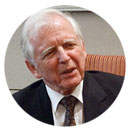
Professor Dr. Dr. h. c. mult. Harald zur Hausen, MD
Professor Harald zur Hausen has been honored with Nobel Prize in Medicine and Physiology in 2008 for the discovery of the role of DNA-based HPV, which has lead to the first anti-cancer vaccine for cervical cancer. He studied medicine at the Universities of Bonn, Hamburg, and Düsseldorf, where he was appointed doctor of medicine in 1960. From 1965 to 1969 in the Philadelphia Pediatric Hospital, USA, with the couple of virologists Werner and Gertrude Henne they discovered that the Epstain-Bar virus can transform healthy cells into cancerous. In 1977 he became a researcher at the University of Freiburg. From 1983 until 2013, he was Scientific Director of the German Cancer Research Center in Heidelberg (DKFZ). To date, he has received many national and international awards, including the Robert Koch Award, the Charles S. Mott Award of the Cancer Research Foundation, the Clinical Research Prize of the Federation of European Cancer Society, the William B. Coley Award for Distinguished Basic Immunology Research The Cancer Research Institute, and the Warren Alpert Award from Harvard University.
Read more: https://www.dkfz.de/en/zurhausen/

Professor Dr. Otmar D. Wiestler, MD
Otmar D. Wiestler was born in Freiburg (Breisgau, Germany) on 6 November 1956. After completing his medical studies at the University of Freiburg, he obtained his Doctorate in Medicine in 1984 (summa cum laude). Between 1984 and 1987 he was a postdoctoral researcher at the Department of Pathology at the University of California, San Diego, USA. He then changed to the University Hospital Zurich in Switzerland, where he qualified as University Lecturer in Pathology. In 1992 the University of Bonn appointed him as Professor for Neuropathology and Director of the Institut für Neuropathologie where hehelped to establish a large neuroscientific research centre. Between January 2004 and August 2015 Professor Wiestler led, as Chairman of the Executive Board and Scientific Director, the German Cancer Research Center in Heidelberg (DKFZ), which is one of the leading institutions in cancer Research in the world.
Read more: https://www.helmholtz.de/en/about_us/the_association/president/

Professor Dr. Michael Baumann, MD
Professor M. Baumann is the Chairman and Scientific Director of DKFZ since November 2016. After completing his medical studies at the University of Hamburg, Professor Michael Baumann obtained his Doctorate in Medicine in 1988. He then worked as a postdoctoral fellow at Massachusetts General Hospital at the Harvard Medical School in Boston. After his training as a specialist for radiotherapy he habilitated in 1994 in Hamburg. In 1995, he changed to the Faculty of Medicine Carl Gustav Carus in Dresden as Head of Experimental Radiooncology. In 2001 the Dresden University of Technology appointed Michael Baumann as Professor for Radiooncology. During his time as Chair of the Department of Radiation Oncology at the University Hospital Carl Gustav Carus, director at the Institute for Radiooncology at the Helmholtz Center Dresden-Rossendorf, as well as director of the OncoRay Center, he significantly contributed to the radiooncological research in Dresden. Furthermore, he was the founding director of the University Cancer Center Dresden and spokesperson of the DKTK and NCT partner site Dresden. His research focuses on translational-orientated experimental radiotherapy and radiobiology, as well as the treatment of lung and head and neck cancer. M. Baumann has been honored with numerous scientific awards including the Michael Fry Research Award of the Radiation Research Society, the Breur Gold Medal and Regaud Medal Award of the European Society for Therapeutic Radiology and Oncology. In 2004, he was appointed as a member of the National Academy of Science (Leopoldina) and has been President of the European Society for Radiotherapy and Oncology (ESTRO), the European CanCer Organisation (ECCO) and the German Society for Radiation Oncology (DEGRO).
Read more: https://www.dkfz.de/en/dkfz/struktur/vorstand.html

Professor Dr. Josef Puchta
Professor Josef Puchta is the Administrative Director of DKFZ since August 1996. He studied economics at the universities of Augsburg and Erlangen-Nürnberg. He received his Ph.D. Rer. Pol. From the University of Oldenburg, where he worked at the Institute of Comparative Political Studies. In 1983 and 1984 Dr. Puchta conducted research in Canada. From 1987 to 1992 he worked in Berlin for the German Institute for International Development (DSE) and the Department of the Senate of Economics and Technology of the State of Berlin. In 1992, Dr. Josef Puchta was appointed Administrator of the German Institute of Human Nutrition (DIfE) in Potsdam. From 2001 to 2003, Puchta served as representative of commercial directors and member of the board of directors of the Helmholtz Association. In 2011 he became Professor of the Biotechnology Department of the University of Mannheim.
Read more: https://www.dkfz.de/en/dkfz/struktur/vorstand.html

Professor Dr. Antonia Dimitrakopoulou-Strauss, MD
Upon completion of the studies of medicine at the University of Athens in 1988, she joined the Dept. of Radiology of the German Cancer Research Center, where she completed the doctorate in medicine in 1990. The research focus of her was the use of positron emission tomography in oncological patients, in particular the use of new methodological aspects for the combination of basic with translational research. In 2004 she became an Assistant Professor of Nuclear Medicine and in 2007 an Full Professor. New imaging technologies using studies with radiolabelled cytostatic agents, peptides, amino acids, perfusion, hypoxia as well as proliferation tracers on the field of oncological PET were the focus of her work. Individualization of chemo- and immunotherapy and prognosis of therapeutic outcome is one of her major research topics. Methodological aspects as well as the relation between molecular imaging data and omics data is the current field of her research. Since 2013 she is Deputy Head of the Clinical Cooperation Unit Nuclear Medicine at the DKFZ. Since 2017 she coordinates for the DKFZ side the activities for the establishment of the Athens Comprehensive Cancer Center (DKFZ). Overall, she has co-authored more than 150 peer-reviewed publications. She is member of several Editorial Boards, reviewer for several scientific journals, congresses and grant proposals and has contributed to the organisation of international scientific meetings.
Read more: https://www.dkfz.de/de/nuklearmedizin/mitarbeiter/Dimitrakopoulou_Strauss_detail.html

Professor Dr. Paula T. Hammond
Dr. Hammond is the David H. Koch Professor in Engineering and Head of the Department of Chemical Engineering at the Massachusetts institute of Technology (MIT). She received her B.S. in Chemical Engineering from MIT in 1984, her M.S. from Georgia Tech in 1988, and earned her Ph.D. from MIT in 1993. In 1994, she was awarded the NSF Postdoctoral Fellowship in Chemistry while performing postdoctoral research in the Harvard University Chemistry Dept as a member of the Whitesides research group. In 2000, she was awarded the Junior Bose Faculty Award, and the GenCorp Signature University Award. She has also received the NSF Career Award, the EPA Early Career Award, the DuPont Young Faculty Award, and the 3M Innovation Fund Award. Recently, The Harvard Foundation presented Dr. Hammond the 2010 Scientist of the Year Award as part of its annual Albert Einstein Science Conference: Advancing Minorities and Women in Science, Engineering, and Mathematics. Dr. Hammond was also one of a group of key faculty members involved in starting the Institute for Soldier Nanotechnologies, and in 2015, she was named head of MIT's Department of Chemical Engineering. She is an Elected Member at the National Academy of Medicine as of 2016.
Read more: https://hammondlab.mit.edu/paula-t-hammond

Professor Spiros Linardopoulos
Professor Spiros Linardopoulos has been working at the Breakthrough Cancer Research Center and the Institute for Cancer Research as head of the research team since September 2000. Professor Linardopoulos has extensive experience in experimental cancer and cancer cell biology, industrial and academic research, and Focused on drug development. In 1997 Prof Linardopoulos joined Onyx Pharmaceuticals, Richmond, CA, USA as Deputy Scientific Project Manager who identified the mechanisms of action for several small molecule inhibitors and guided drug development over selected therapeutic targets. Prior to moving to the US, Prof Linardopoulos completed three years as a postdoctoral researcher at the Beatson Institute for Cancer Research, Glasgow, UK (1993-1997). Dr Linardopoulos received his BSc in Chemistry at the State University of Moscow and completed postgraduate studies at the Institute of Biological Research and Biotechnology, National Hellenic Research Foundation in Athens, when he received his Ph.D. in Cellular and Molecular Biology of the Department of Biology, 1993.
Read more: https://www.icr.ac.uk/our-research/researchers-and-teams/professor-spiros-linardopoulos